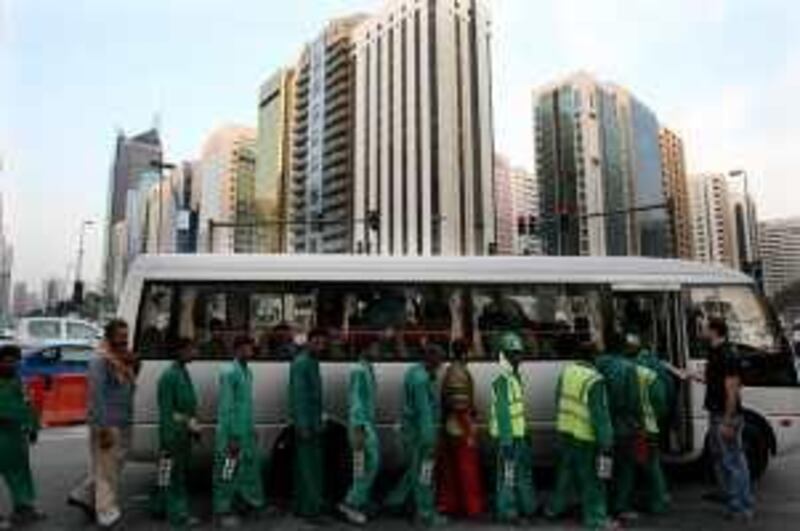How can the GCC create a labour market that can meet the region's demand and help shield it against the repercussions of economic fluctuation? The question is pressing. Given the GCC's heavy reliance on foreign labour to fill the jobs that the region's growing economies create, and the GCC's rising unemployment rate among nationals, the profound mismatch between the needs of the market and the skills of nationals can no longer be ignored.
For the longest time, booming oil prices created a sense of endless prosperity in the GCC. Governments spent generously and used surplus oil revenues to subsidise public services and employ nationals in the public sector. At the same time, in order to satisfy the growing demands for labour in the private sector, GCC governments threw their doors open to foreign workers. This created a labour market dichotomy: nationals largely clustered in the public sector while non-nationals dominated the private sector. Over time, a tremendous gap developed between the needs of the marketplace and the skills of nationals. This dynamic - commonly referred to as "structural unemployment" - is a pervasive problem throughout the region.
Today, the unemployment rate of nationals in the GCC ranges between 11 and 12 per cent. Exacerbating this mounting structural problem is an educational system that has not kept pace with the needs of the GCC economies. To address such structural problems, some GCC governments have shifted to restricted quantitative labour market policies such as imposing quotas on the private sector as part of their nationalisation policies. However, most of these policies have not yet proven to be effective in addressing the real causes behind unemployment, thus requiring a shift towards a more formalised labour strategy with set objectives and articulated policies.
Setting objectives for the labour market is always a balancing act. On the one hand, policymakers want to maintain flexibility, create jobs and infuse the labour market with a sense of energy and opportunity. On the other hand, there is a real desire to protect those who are already employed. Flexibility objectives focus on avoiding institutional wage arrangements such as minimum wage and collective bargaining. Security objectives involve protecting workers against arbitrary dismissal, the establishment of health and safety regulations in the workplace, and providing benefits during periods of unemployment.
Almost all the GCC labour policies promote security over flexibility, protecting nationals - even when they lack adequate skills - by placing quantitative restrictions on the number of foreigners who are allowed to work in a specific field. However, this dynamic is a double-edged sword; while it increases security, it does little to promote competitiveness. Labour market policies ultimately need to rest on three pillars: active, passive and protective. In the case of GCC countries, a balance of active and passive labour policies is needed to create work incentives that will ensure sustainable opportunities for nationals and decrease dependence on the state, as well as ensure robustness against economic shocks. Active labour market policies include job creation programmes, training and retraining initiatives, and public employment services. They are designed to create jobs and improve the quality of the labour market. In addition to providing the unemployed with work, active policies attempt to create a more robust and skilled labour pool.
By improving the matching of workers and jobs, active policies increase productivity and earnings. At the moment, strikingly few active policies are implemented in GCC countries. However, the GCC desperately needs more of these policies. These programmes, which create positive incentives in the market, can ultimately replace the restrictive nationalisation policies currently in place in the GCC that are responsible for a great deal of the labour market's rigidities.
Passive policies in the form of financial assistance are aimed a providing a safety net for workers during periods of unemployment and potential downturns (similar to the latest financial crises). There are two types of passive programmes: unemployment insurance and unemployment assistance. Insurance programmes are mandatory in most countries in the world and tend to be jointly funded by employers and employees. With the exception of Bahrain, there are currently no unemployment insurance programmes in the GCC, either mandatory or voluntary. Governments typically support such policies out of social responsibility, along with the desire to ease people's financial distress during unemployment spells. While abandoning these programmes entirely is not recommended - especially since they are needed in time of crises - universal reliance on welfare will diminish once more active policies are put into place.
Protective policies, which govern fair and appropriate labour standards and conditions, typically take the form of legislation and regulations. The GCC's heavy reliance on foreign labour creates a need for measures to protect the rights of non-nationals, and will allow the region to remain attractive as a labour destination in coming years. As such, a clear articulation of objectives and adequate mix of labour policies will go a long way in addressing labour-market inflexibilities, fragmentations and mismatches.
Rabih Abouchakra is a partner, Samer Bohsali a principal and Mona Hammami an associate at the Booz & Company management consultancy





